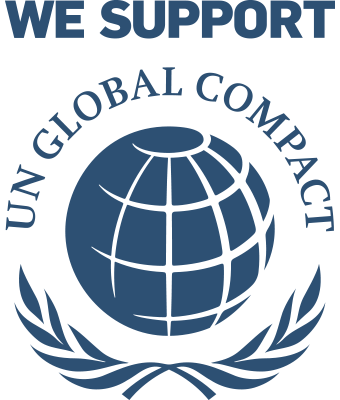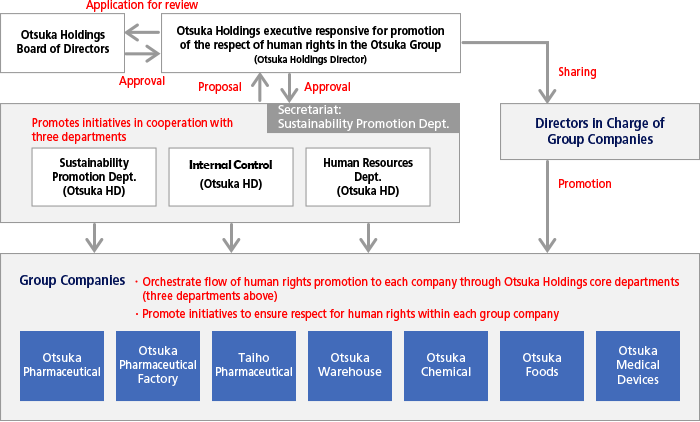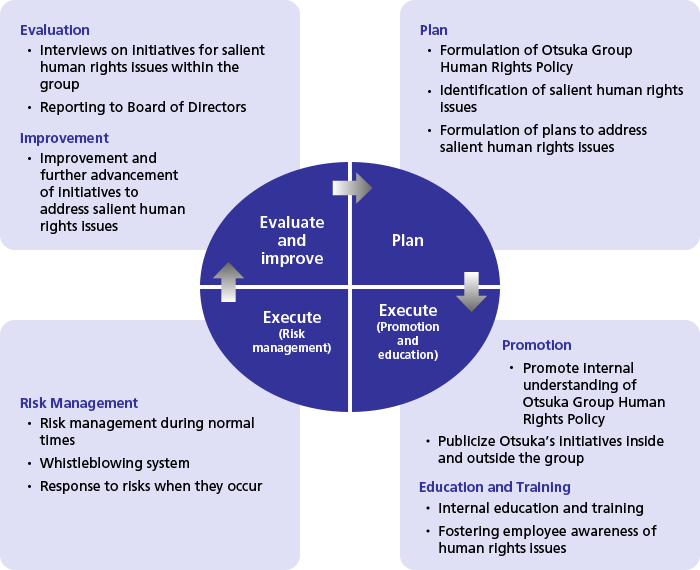Core Principles

The Otsuka group recognizes that respect for human rights is the pillar of all business activities. Therefore, we promote initiatives throughout the entire group. We joined the United Nations Global Compact (UNGC) in 2016andsigned the Women's Empowerment Principles (WEPs)in 2017, which were jointly formulated by the UNGC and UN Women as a set of principles based on which companies should voluntarily promote the active participation of women.
In 2020, we formulated the Otsuka Group Human Rights Policy in accordance with the United Nations Guiding Principles on Business and Human Rights. Based on this policy, we are promoting human rights initiatives across the group.
- Otsuka Group Human Rights Policy
- Otsuka Group Global Code of Business Ethics
- Otsuka Group Business Partner Code of Ethics
We have identified the important human rights issues for each stakeholder as the "Otsuka Group Key Human Rights Issues" and are building a mechanism for respecting human rights in collaboration with independent external experts under the following promotion system. We conduct human rights risk assessments in our supply chain and directly confirm and investigate these risks through dialogue with external parties to ensure proper management as necessary. We also provide internal education on human rights, conduct regular monitoring, and have established an internal whistleblowing hotline that can be used anonymously, as well as a Speak Up Line for external stakeholders.
Promotion Framework
Under the sustainability promotion system, the Otsuka group promotes initiatives to respect human rights, led by the "Otsuka Group Human Rights Task Force," which consists of members from compliance, human resources, and sustainability promotion. This task force collaborates with relevant departments of group companies. The content and issues of these efforts are reported to the Sustainability Promotion Committee, and important topics are also submitted and reported to the Board of Directors of Otsuka Holdings. In the 2024 committee, the following reports and discussions took place.
- Environment and Human Rights
- Human Rights of Business Partners and Suppliers
- Enhancing Employee Engagement
- Access to Remedies: Speak-up Line
- Human Rights for Consumers and Customer Harassment

The Otsuka Group Human Rights Task Force collaborates with the operational departments of each group company to ensure that the responsibility to respect human rights in accordance with the Human Rights Policy, is fulfilled and that operations are conducted appropriately. The task force provides suggestion, recommendations, and supervision as necessary. For example, it engages in educational and awareness-raising activities related to human rights, conducts human rights due diligence, and establishes human rights remediation mechanisms.
Initiatives Regarding Respect of Human Rights
In 2019, Otsuka Holdings and the main operating companies* have conducted human rights assessments. Based on the results, we have established the "Otsuka Group Key Human Rights Issues" as a commitment to our stakeholders. We continuously work to identify, prevent, and mitigate negative impacts on human rights.
- *Otsuka Pharmaceutical, Otsuka Pharmaceutical Factory, Taiho Pharmaceutical, Otsuka Warehouse, Otsuka Chemical, Otsuka Foods, and Otsuka Medical Devices
Related to Management and Employees
As a signatory of the United Nations Global Compact, we are committed to the elimination of forced labor and the abolition of child labor, as we aim to create comfortable work environments in which human rights are fully respected. To maintain fair and open workplaces, we strictly prohibit discrimination and harassment. As a total healthcare company, we strive to provide workplace environments in keeping with the principles of health and productivity management, in which management and employees are encouraged to take the initiative in developing and maintaining their own health.
Related to Our Patients and Consumers
The Otsuka group contributes to the health and Well-being of people worldwide, through the creation of innovative products and services. As a total healthcare company seeking solutions for health-related issues, we recognize our responsibility to patients and consumers, always prioritizing the quality and safety of our products, and reinforcing our supply chain. When issues regarding our products or services become apparent, we will collaborate with relevant departments to collect and analyze information and develop appropriate responses, enabling us to continue to provide our valued customers with better products and services.
- Otsuka Group Quality Policy
- Basic Approach and Policy for Sales and Promotion in the Pharmaceutical Business
- Otsuka Group Marketing Communication Policy
- Declaration of Consumer-oriented Commitment
Related to Our Business Collaborators
In keeping with the principles of the United Nations Global Compact, we share our concerns for human rights, labor, environment and anti-corruption with our business collaborators and engage in ongoing dialogue and consultation to ensure respect for human rights across our entire supply chain.
- Otsuka Group Procurement Policy (5 languages)
- Otsuka Group Sustainable Procurement Guidelines (5 languages)
Related to Society
We believe that efforts to reduce environmental issues are closely related to the issues surrounding human rights, and we will proactively and continuously engage in initiatives that benefit local communities and general society.
Related to Our Stakeholders
To fulfill our responsibility to respect human rights, we recognize the importance of ongoing dialogue and will proactively seek opportunities to engage with diverse stakeholders. We are also working to establish contacts and grievance mechanisms to address any human rights issues that may come to light.
External Collaboration
The Otsuka group, as a signatory company of the UN Global Compact, is part of the Human Rights Due Diligence Working Group1, Human Rights Education Working Group2, Supply Chain Working Group, and WEPs Working Group3 of Global Compact Network Japan (GCNJ), and together with other participating companies and organizations, obtains knowledge that can be used in the Otsuka group's initiatives.
- 1Participating companies engage in activities and share information useful in their own concrete initiatives, using as reference the seven WEPs principles, which contribute to enhancing the international competitiveness of GCNJ signatory companies and improving gender equality in Japanese society.
- 2Deepening the understanding of human rights education and creating educational tools that can be used internally by all employees through teaching basic knowledge of the United Nations Guiding Principles on Business and Human Rights, lectures by experts, case studies from other companies, and interaction between participants.
- 3Promotes the efforts of each company through lectures by experts, progress assessments of company initiatives, workshops, group work and other activities to learn together about human rights due diligence initiatives based on the United Nations Guiding Principles on Business and Human Rights.
Human Rights Due Diligence
To fulfill our responsibility to respect human rights, the Otsuka group conducts human rights due diligence in accordance with the United Nations "Guiding Principles on Business and Human Rights." We continuously work to identify, prevent, and mitigate negative impacts on human rights in our business activities. We regularly conduct internal communication on human rights risks and have established a system to continuously address these risks across the group. Otsuka Holdings and major group companies have set up internal whistleblowing hotline, including those for human rights issues, as well as external channels through law firms and other external organizations. The operation status of the internal reporting system is regularly reported to the Board of Directors of Otsuka Holdings. Additionally, we aim to build trust with stakeholders by enhancing communication and collaboration through various methods.

Whistleblowing Hotline
Internal Whistleblowing Hotline
The Otsuka group has established internal whistleblowing Hotline at each group company to ensure that any illegal acts, including bribery, violations of policies, laws and regulations, can be quickly uncovered and lead to corrective action. It applies to contract, dispatched, and part-time employees in addition to full-time employees. We have established a reporting system at the offices of an attorney and other external locations that can be accessed safely and anonymously and so that people can utilize it without any concerns. Information about whistleblowers and their reports is strictly managed, and to prevent any repercussions, information is only shared with those who must know to conduct investigations and take corrective action. Information on the operation the internal reporting systems at group companies is regularly reported at meetings of the Board of Directors of Otsuka Holdings.
Formulation of Otsuka Group Global Speak-Up Policy
The Otsuka group has established the Otsuka Group Global Speak-Up Policy with the aim of clarifying the basic principles of the internal reporting system and enhancing its effectiveness so that employees can speak up when they become aware of fraud, inappropriate behavior, or any action that goes against the group’s values, policies, or processes, or any other suspect behavior.
Basic Principles
・Employees have the right and obligation to report in good faith
・Information will be strictly handled
・Anonymous reports will be accepted
・Reprisals against anyone making a report are strictly prohibited
・Investigations, corrective action, and preventive measures will always be carried out for a reported violation
External Inquiries and Whistleblowing Hotline
Otsuka Holdings and major group companies have established a whistleblowing hotline that accepts inquiries and opinions from external stakeholders and general customers.
- Inquiries Regarding Otsuka Holdings
For inquiries to each Otsuka group company, please visit the respective company's website.
- Consultation and Speak Up Line for business partners (anonymous consultations and reports are also accepted)








